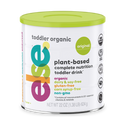A Better Nutritional Supplement for Children with Failure to Thrive
Explore valuable insights and discover the perfect nutritional solution for children with failure to thrive.
Published May 6, 2024

Failure to thrive is a concerning problem for many children, and it occurs in a variety of scenarios. It is defined as a deceleration or arrest in a child’s expected growth, and it can be associated with abnormal physical and cognitive development (source). Whether or not a child is meeting the expected growth parameters is determined by measuring the child’s weight and height in correlation to age. During routine visits with your child’s physician, these measurements are plotted onto a standardized growth chart. Charts for infants differ from those of children over the age of two (source). While the diagnostic criteria varies among pediatric authorities, there is a consensus that failure to thrive is characterized by the following (source):
- A weight below the 5th percentile
- A progressive decline in a weight or height percentile
- A weight to height ratio of less than 80%
Although there can be a variation in the expected milestones by country and ethnicity, a trend of poor weight gain or delayed growth is consistent with a failure to thrive.
Medical and Environmental Causes
Failure to thrive is often seen in children who have medical conditions where the rate of calorie metabolism is higher than normal. In some forms of congenital heart disease, the workload on the heart is increased, and more calories are used than in a structurally normal heart (source). The increased work of breathing seen in cases of interstitial lung disease, premature lungs, and cystic fibrosis can result in a higher calorie expenditure. Hyperthyroidism is often characterized by weight loss, and stunted growth is common when hypothyroidism is untreated (source). For any of these situations, if a child’s diet is not modified to accommodate the excessive caloric need, growth and weight gain are diminished.
Neurological Disorders and Failure to Thrive
Certain neurological disorders are associated with a failure to thrive. If a hypoxic event or other trauma occurred at birth, brain function may be impaired in a way that affects a child’s ability to consume adequate calories. Swallowing difficulties are common in children with cerebral palsy or intractable seizure disorders (source). Food texture phobias and limited diets often coexist with speech delay and autism.
Gastrointestinal Problems and Failure to Thrive
Failure to thrive is very common among children with gastrointestinal problems that prevent complete absorption of nutrients from the intestines. Such conditions include inflammatory bowel diseases, chronic diarrhea, celiac disease, and some food allergies (source). In addition to the increased respiratory demands of cystic fibrosis, a child’s growth and weight gain are impaired by poor absorption of nutrients (source). Its pathognomonic gene mutation alters gastrointestinal tract secretions, blocking the passage of the pancreatic enzymes needed for digestion.
Other Contributing Factors
Less frequently, congenital facial anomalies like a cleft palate make eating more difficult. Many disorders cause by chromosome abnormalities are associated with poor growth such as Down and Turner’s syndromes (source). The presence of sepsis or a chronic infection often results in a temporary increase in caloric need. The metabolic expenditure needed to fight such infections is high, resulting in excessive weight loss (source).
In the absence of a medical diagnosis, most cases of nonorganic failure to thrive are the result of poor nutrition or unbalanced eating habits. This finding has been documented in several clinical studies (source). One such study discovered that “picky eating” habits were a common culprit (source). Alternatively, insufficient access to food and situations of child neglect are less common reasons that a child may not achieve the expected developmental milestones.
Clinical Findings
While poor weight gain and delayed growth are the hallmarks of failure to thrive, other signs may be noted. Toddlers and younger children may exhibit delays in motor, speech, and cognitive skills (source). Older children may have learning and behavior problems. These children may also seem excessively tired or irritable. Social skills may be impaired as well as the ability to fight infections (source). Delays in puberty and physical maturation are also common.
In practice, an important first step in evaluating such a patient is to take a thorough medical history. If it appears that access to food is sufficient, the quantity and quality of this food must be assessed. If inadequate, dietary modifications are recommended while closely monitoring the child’s height and weight over several months. If there is no improvement, blood and urine tests are the first line of assessment (source). If needed, a specialist referral is then made based on these results.
When a medical condition is the underlying cause of failure to thrive, the help of an interdisciplinary team is often enlisted. This may include a nutritionist, a speech or occupational therapist, and an appropriate pediatric subspecialty provider (source). Speech therapists, in particular, help to reduce a child’s preference for certain textures, and assist with swallowing difficulties. A customized high calorie diet may be recommended that includes the use of a nutritional supplement. Interventions focus on both “catching up” to normal growth and weight as well as maintaining progress.
A different strategy is employed when environmental or social factors are the issue. Recommendations for younger children differ from those of older ones. Since toddlers tend to consume smaller meals, offering foods before fluids can encourage better eating (source). Calorie dense foods and nutritional supplements are often helpful, especially in the presence of iron and vitamin D deficiencies (source). Avoiding low nutrient “junk” foods and “sugary” beverages can improve the intake of more beneficial foods. In rare but severe cases, hospitalization may be required to initiate a nutritional plan, and for closer monitoring of caloric intake.
A Better Nutritional Supplement
The primary treatment goal for a child with failure to thrive is to promote the return of normal weight gain and growth. In many of these situations, a nutritional supplement such as ELSE could be uniquely beneficial. ELSE is available in three calorie formulations: 180kcal, 220kcal, and 240kcal. This allows customization to fit a child’s needs. While there are supplements currently marketed for a variety of nutritional concerns in children, ELSE differs from them all. It is minimally processed, and has no added sugar or artificial flavorings. An apple concentrate is its only sweetener. Therefore, it is appropriate for any cause of failure to thrive except a fructose intolerance. Unlike other products, the protein in ELSE is sourced from almonds and buckwheat. Because almonds are a natural source of linoleic acid, the kinds of oils added to other products on the market are not needed. ELSE also contains algae-derived sources of docosahexenoic acid (DHA) and arachidonic acid (ARA), important for brain development. In addition, it provides a variety of vitamins and minerals, including those which may be deficient in children who are underweight and growing poorly. ELSE stands out as a better nutritional supplement that can meet the unique needs of children with failure to thrive.
The content and advice provided in this article is for informational purposes only and is not a substitute for medical diagnosis, treatment, advice for specific medical conditions. Always consult a pediatrician to understand the individual needs of your child.










